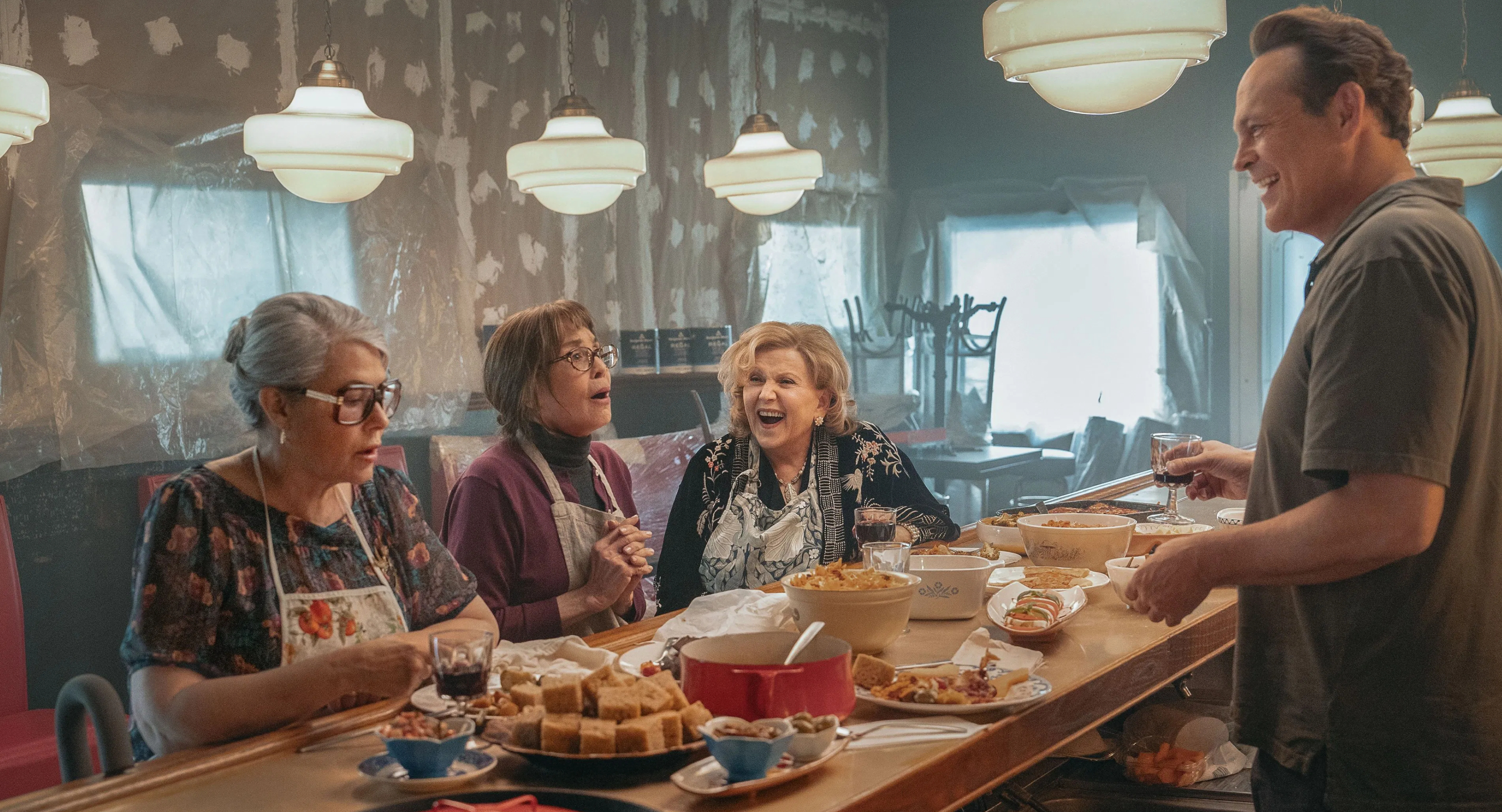Nonnas – Film Review
Published May 9, 2025

In Stephen Chbosky’s Nonnas, the kitchen is warm, the sauce is simmering, and the matriarchs are plenty. This sentimental comedy, written by Liz Maccie, brings together Vince Vaughn, a cast of legendary actresses, and an irresistibly cozy concept: a grieving man opens an Italian restaurant staffed entirely by real nonnas — wise, feisty grandmothers with a lifetime of recipes and attitude. While the film delivers on its premise with heart and humor, it also plays it safe, rarely venturing beyond crowd-pleasing convention.
Vince Vaughn plays Joe Scaravella, a Staten Island native with a broken heart and a dream. Still mourning the recent loss of his beloved mother, Joe finds himself drifting, emotionally stalled and professionally uninspired. But when a spontaneous act of generosity at a local community center leads him to a group of elderly women cooking for charity, he’s struck with an idea: what if the world could experience the love, care, and authenticity he grew up with — not through memories, but through food?
Enter Enoteca Nonna, a passion project restaurant with a twist: the chefs are actual nonnas, each specializing in a dish from their family heritage. It’s a premise ripe with potential for warmth and culture-clash comedy, and Nonnas wastes no time assembling its cast of Italian-American legends. Susan Sarandon plays Gia, the de facto ringleader of the group — strong-willed, no-nonsense, and fiercely loyal. Talia Shire’s Teresa is the quiet moral compass, steeped in tradition, while Brenda Vaccaro’s Antonella provides comic relief with her bluntness and bawdy sense of humor.
Together, they form a kind of geriatric Ocean’s Eleven, with ladles instead of larceny. Their chemistry is undeniably the film’s greatest strength. Scenes of the women bickering over recipes and rolling pasta while arguing about various topics provide a charm and texture that feel authentic, if a bit idealized. Chbosky allows these moments to breathe, and the film is at its most engaging when it leans into the specific — the linguistic shorthand of immigrant families, the way grief is metabolized through shared meals, the stubborn pride in doing things “the right way.” But while the film’s ingredients are promising, its execution can be a little overcooked.
Structurally, Nonnas falls into a well-worn pattern familiar from other food-centric feel-good films like Chef, Julie & Julia, or The Hundred-Foot Journey. The narrative beats are all present: the early setbacks, the ragtag team bonding through adversity, the critic’s visit, the sudden crisis that threatens the restaurant’s survival, and the eventual emotional catharsis. It’s not a crime to be formulaic — especially in a comfort movie — but the film rarely surprises or challenges the viewer. It aims for cozy and mostly succeeds, but one wishes for a little more spice.
Joe’s character arc, in particular, feels a little underdeveloped. Vaughn gives a restrained performance, dialed down from his typical fast-talking wise-guy persona, and it works in the more emotional beats — especially in quiet scenes. However, the film doesn’t give him quite enough depth. His grief is sincere, but surface-level, and the script misses opportunities to dig further into the tension between honoring the past and building a future.
Where the film does excel is in its depiction of food as memory. The dishes — lovingly shot — aren’t just meals, they’re vessels of legacy. These culinary anecdotes lend the film a poetic undercurrent, suggesting that to cook is to remember — to resist the erasure of one’s roots in a rapidly modernizing world. In this regard, Nonnas flirts with being something more profound than it ultimately chooses to be.
Stephen Chbosky, best known for The Perks of Being a Wallflower and Wonder, directs with a gentle hand, clearly invested in the emotional sincerity of the story. There are no flashy camera tricks here, and very little cynicism. He treats his older actresses with respect and gives them space to shine. The pacing, however, occasionally drags — particularly in the second act, when the film indulges in a montage-heavy sequence that feels more like filler than development.
Liz Maccie’s script is earnest and laced with humor, though it often veers into cliché. Certain lines of dialogue here will either melt your heart or roll your eyes, depending on your tolerance for Hallmark-level sentiment. Still, there’s genuine warmth behind the corniness, and Maccie smartly grounds the drama in cultural specifics that elevate the otherwise familiar plot.
Supporting performances also bolster the film’s appeal. Bracco and Shire, in particular, bring a lived-in realism to their roles, and a late scene between their characters — reflecting on the children they raised, the husbands they lost, and the food that outlived them all — is the emotional high point of the film. It’s a moment that hints at what Nonnas could have been if it had taken more risks: not just a comedy with heart, but a real meditation on aging, identity, and legacy.
Ultimately, Nonnas is a film that plays it safe, but plays it well. It’s a Sunday dinner of a movie — a little heavy, a little familiar, but made with love. For those seeking comfort, nostalgia, and a reminder that the kitchen is often the heart of a home, this film will satisfy. But for viewers looking for sharper wit, deeper character exploration, or innovation in its storytelling, Nonnas may feel like a missed opportunity — a flavorful appetizer that never quite becomes a full meal.
